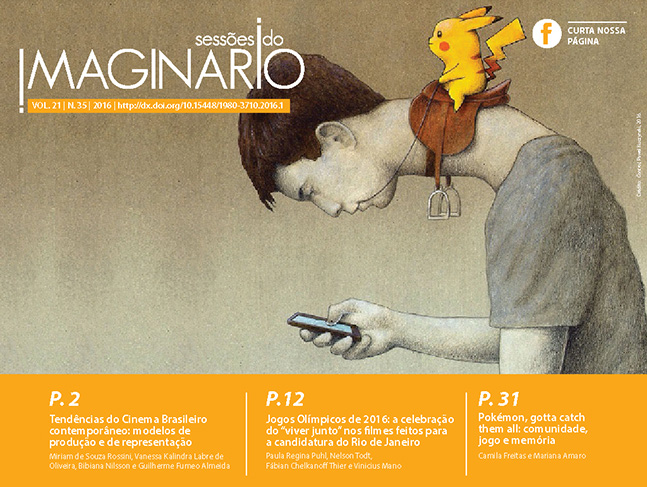Pokémon, gotta catch them all: comunidade, jogo e memória
DOI:
https://doi.org/10.15448/1980-3710.2016.1.21249Keywords:
Jogos Digitais, Inteligência Coletiva, MemóriaAbstract
O presente artigo propõe uma reflexão teórica sobre as interações entre memória e comunidade no gameplay de Pokémon Red (1996) via Twitch, o qual, a partir da mobilização de uma inteligência coletiva, deu origem a uma memória coletiva embasada na ressignificação da narrativa do jogo pelos próprios usuários. Sob os pilares da cultura remix, este texto destaca a importância da participação e, também, da mobilização de tal inteligência, a fim de cooperar tanto na manutenção quanto na criação de uma memória relacionada à comunidade na rede. Ao observar o conteúdo narrativo do objeto desta análise, foi identificada a construção de um universo extradiegético, diretamente relacionado à comunidade e ao gameplay.
References
Referências
AARSETH, Espen. How we became post digital: from cyberstudies to games studies. In: SILVER, David; MASSANARI, Adrienne (Org). Critical Cyber-culture Studies. New York: New York University, 2006. pp. 37-46.
GENETTE, Gérard. Discurso da Narrativa. Lisboa: Vega, s/d.
HALBWACHS, Maurice. A Memória Coletiva. 2ª ed. São Paulo: Centauro, 2006.
HIEFTJE, Shin. The Mythos Behind Twitch Plays Pokémon. Game Informer, Minneapolis, 12 mar. 2014. Disponível em: <http://www.gameinformer.com/b/features/archive/2014/03/12/exploring-the-created-mythos-of-twitch-plays-pokemon.aspx>. Acesso em 3 mai. 2015.
JENKINS, Henry. Cultura da convergência. São Paulo: Aleph, 2008.
JENKINS, Henry; FORD, Sam; GREEN, Joshua. Spreadable Media: creating value and meaning in a networked culture. New York e London: New York University Press, 2013.
LÉVY, Pierre. Cibercultura. São Paulo: Editora 34, 1999.
__________. A Inteligência Coletiva. 7ª ed. São Paulo: Loyola, 2011.
POKEMÓN RED. [S.I.]. Nintendo, Estados Unidos, 1996. Cartucho.
POLLAK, Michael. Memória e identidade social. In: Estudos Históricos, Rio de Janeiro, v. 5, n. 10, pp. 200-212, 1992,. Disponível em: <http://www.pgedf.ufpr.br/downloads/Artigos%20PS%20Mest%202014/Andre%20Capraro/memoria_e_identidade_social.pdf>. Acesso em 4 mai. 2015.
RUIZ, Castor Bartolomé. Os Paradoxos do Imaginário. 2ª ed. São Leopoldo: Editora Unisinos, 2004.
SHIFMAN, Limor. Memes in Digital Culture. Cambridge: MIT Press, 2013.
TURKLE, Sherry. Alone Together: Why we expect more from technology and less from each other. New York: Basic Books, 2011.
Downloads
Published
Issue
Section
License
Copyright (c) 2016 Sessões do Imaginário

This work is licensed under a Creative Commons Attribution-NonCommercial 4.0 International License.
COPYRIGHT
The submission of originals to Imaginario implies the transfer by the authors of the right for publication. Authors retain copyright and grant the journal right of first publication. If the authors wish to include the same data into another publication, they must cite Imaginario as the site of original publication.
CREATIVE COMMONS LICENSE
As this journal is open access, the articles are allowed free use in scientific and educational applications, with citation of the source.
According to the type of Creative Commons License (CC-BY 4.0) adopted by Imaginario, the user must respect the requirements below.
You are free to:
Share — copy and redistribute the material in any medium or format.
Adapt — remix, transform, and build upon the material for any purpose, even commercially.
However, only under the following terms:
Attribution — You must give appropriate credit, provide a link to the license, and indicate if changes were made. You may do so in any reasonable manner, but not in any way that suggests Imaginario endorses you or your use.
No additional restrictions — You may not apply legal terms or technological measures that legally restrict others from doing anything the license permits.
Notices:
You do not have to comply with the license for elements of the material in the public domain or where your use is permitted by an applicable exception or limitation.
No warranties are given. The license may not give you all of the permissions necessary for your intended use. For example, other rights such as publicity, privacy, or moral rights may limit how you use the material.
For more details on the Creative Commons license, please follow the link in the footer of this website.

